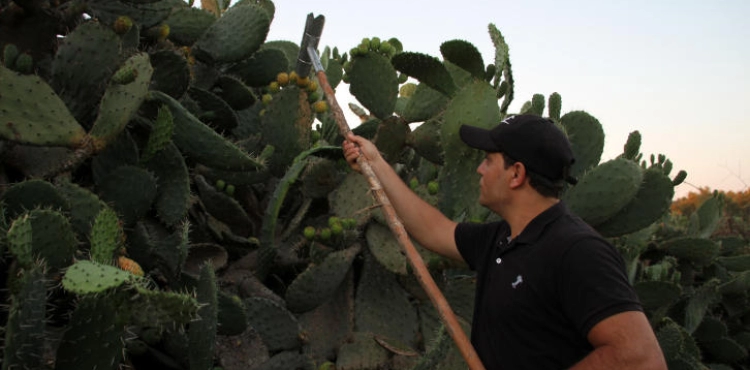The fruit of "patience" is preferred by Palestinian farmers in the Gaza Strip due to the popular demand, despite the fact that its harvest involves great difficulties.
The patience fruit or prickly pear is known for its filling with thorns on the green panels that carry ripe fruits, with the possibility of the thorns flying over the bodies and injuring them, which makes it difficult to harvest them.
With the early hours of the dawn, Muhammad Abu Tir, a 50-year-old from Khan Yunis in the southern Gaza Strip, heads every day with his three sons to his border land to reap the ripe fruits of patience.
"We used to reap the fruits on these days and sell them in the markets to make some money," Abu Teer said, while he was stretching out a long stick with a curved tip called (Tawala) to pick up the fruit.
"The people of Gaza are waiting for the season to buy aloe vera / prickly pear and enjoy its sweet taste, as it is one of the favorite fruits, despite the possibility that they have the thorns scattered around each fruit," he added.
Abu Tair begins annually by picking the crop from the beginning of July until the end of August on a daily basis, and he transports it to the local market on mobile carts for sale, just like other farmers.
Abu Tir notes that he chooses the times of dawn to reap the fruits, in order to avoid working under the scorching rays of the sun during the day of the peak months of the summer season. Market before noon.
The prickly pear fruit is known in Palestine as the "cactus fruit", as it belongs to the "cactus" family. Its trees grow in dry places due to its stems filled with water.
The fruit of aloes is popular annually in the summer season because it is characterized by its sweet taste and nutritional benefits, provided that it is not consumed excessively, as it causes problems with digestion.
Another advantage of prickly pears is that it is free of any pesticides or drugs other than other fruits, as it is a crop that depends only on rainwater and produces large quantities, according to Abu Tir, who says that with the end of the season he reaps about a thousand dollars from selling patience to help him spend on his family.
However, he complains that he sometimes spends many hours in the local markets selling the crop, but the turnout falls short of his expectations given the difficult economic conditions for the residents of the Gaza Strip, which has been besieged by Israel since 2007.
To overcome this problem, Muhammad Abu Tir, the eldest son of a farmer, worked to devise a new way to market their harvest, by peeling the fruits of prickly pears and selling them in special dishes ready to eat directly.
In an attempt to increase the pace of sales, the young man, Abu Tir, created a special page on "Facebook", where he excels at photographing the fruits of prickly pears in a creative way that impressed his followers across the page.
Muhammad, a graduate of the College of Commerce, told (Xinhua), "There are many customers who avoid buying prickly pears for fear of having fruit thorns, so I found the process of peeling patience and selling it ready as a way to further promote the sale."
"We are in the age of technology and progress, and we can take advantage of all the resources at our disposal to promote creative ideas that will benefit us more and in less time," he added.
For her part, the 30-year-old woman, Ibtisam Al-Ghalayini, told Xinhua that she did not buy patience in the past despite her love for it, due to the difficulty of peeling it, indicating that she currently depends on buying it from Abu Tair after it was shown on his page in FB.
The prickly pear prices vary from one region to another in the Gaza Strip, but farmers usually sell it for a dollar and a half for a kilo.
And spread many popular proverbs related to prickly pears among the residents of Gaza, similar to the difficult climatic conditions in which this type of fruit lives in the difficult conditions they live in in the besieged Strip.
The prickly pear has been used by farmers in Gaza for many years to serve as walls that protect the land from harmful animals and tampering with crops, and the boundary that separates the lands from each other.












